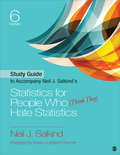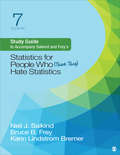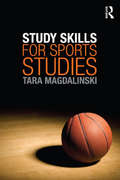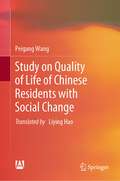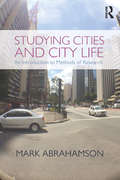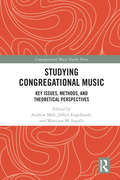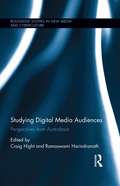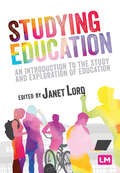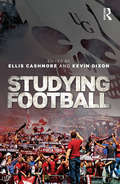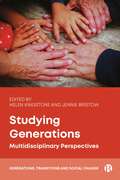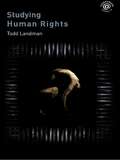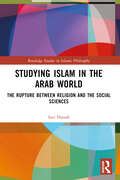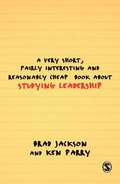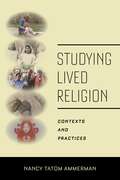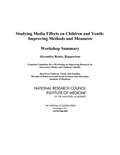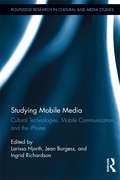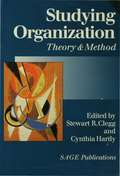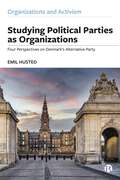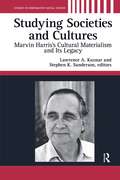- Table View
- List View
Study Guide to Accompany Neil J. Salkind's Statistics for People Who (Think They) Hate Statistics
by Dr Neil J. SalkindThe Study Guide to Accompany Neil J. Salkind's Statistics for People Who (Think They) Hate Statistics, Sixth Edition includes chapter outlines; chapter summaries; learning objectives; key terms; exercises; true/false, multiple choice, and essay questions; as well as answers to all questions. The guide has been updated to match the organization of Salkind’s text and includes activities for the book's new Chapter 19: Data Mining: An Introduction to Getting the Most Out of Your BIG Data.
Study Guide to Accompany Salkind and Frey's Statistics for People Who (Think They) Hate Statistics
by Bruce B. Frey Dr. Neil J. Salkind Karin LindstromThis Student Study Guide includes chapter outlines, chapter summaries, learning objectives, key terms, true/false, short answer and essay questions. Exercises are also included for students to test and apply their knowledge. Answers to all questions are also included. The Study Guide for the Seventh Edition matches the organization of the current Salkind and Frey text.
Study Guide to Accompany Salkind and Frey's Statistics for People Who (Think They) Hate Statistics
by Bruce B. Frey Dr. Neil J. Salkind Karin LindstromThis Student Study Guide includes chapter outlines, chapter summaries, learning objectives, key terms, true/false, short answer and essay questions. Exercises are also included for students to test and apply their knowledge. Answers to all questions are also included. The Study Guide for the Seventh Edition matches the organization of the current Salkind and Frey text.
Study Skills for Sports Studies
by Tara MagdalinskiStarting university can be a daunting prospect, as students come to grips with new ways of working, learning and thinking. Studying sport at university poses particular challenges, with students often engaged in playing or coaching sport alongside their studies and having unconventional working patterns. Study Skills for Sport Studies is the only complete guide to degree-level study to be written specifically for students on sport-related courses, outlining the core academic competencies needed to succeed at university. The textbook offers tips and techniques for all aspects of higher education, including time management, critical thinking, academic research and writing, e-learning, presentations, group work and exams. The practical processes are supported by sports-related examples, and each chapter ends with useful exercises to test your skills as well as reflect on your prior learning experiences. Designed as either a self-paced text or a companion to an introductory class, Study Skills for Sports Studies demystifies the academic skills needed to succeed and helps you make the most of your time at university.
Study of Rural-Urban Sociology 3rd BA Course-3 Block 1-4
by Karnataka State Open UniversityThe document is a 3rd-year B.A. sociology textbook on Rural-Urban Sociology, covering rural and urban societies, their development, issues, and interactions. It is published by Karnataka State Open University and serves as study material for academic and competitive exams.
Study on Quality of Life of Chinese Residents with Social Change
by Peigang WangThis book makes a systematic empirical analysis of the quality of life of Chinese residents from the perspective of social change, expounds the connotation, theory, elements, and research methodology of the quality of life, and focuses on the diachronic dynamic analysis of the multidimensional elements of the quality of life from the perspective of life course and life cycle. According to the research content, the book is divided into three topics. The first topic, from the first chapter to the third chapter, mainly focuses on the quality of life research and theoretical evolution, providing theoretical guidance for the empirical analysis of the book and scientific significance for the study of the quality of life in social change. The second project, from Chapter 4 to Chapter 7, focuses on the influence factors of quality of life of a Chinese resident, structure composition, and the relationship between the related factors to conduct empirical research, the purpose is to more clearly understand the present status of life quality in the Chinese culture, for the further scientific research was related to quality of life to provide the basic framework. The third topic, from Chapter 8 to Chapter 13, focuses on empirical analysis of the changes and development of subjective and objective quality of life of Chinese residents.
Studying Cities and City Life: An Introduction to Methods of Research
by Mark AbrahamsonStudying Cities and City Life is a textbook designed to provide an introduction to the major methods of obtaining data for use when analysing cities and social life in cities. Major chapters focus upon best practices in: field studies (participant observation) natural experiments and quasi-experiments surveys employing probability and non-probability samples secondary analyses of previously published documents. A separate chapter examines a full range of questionnaires and interviews. Each chapter includes discussion of several case studies, and recently published research employing the method being discussed. This discussion highlights the issues and choices made by investigators in actual studies conducted in cities throughout the world. This unique book is designed for use in research methods courses that primarily enroll students majoring in Urban Sociology, Urban Studies, Urban Geography, Urban Planning, and related areas.
Studying Congregational Music: Key Issues, Methods, and Theoretical Perspectives (Congregational Music Studies Series)
by Monique M. Ingalls Jeffers Engelhardt Andrew MallStudying the role of music within religious congregations has become an increasingly complex exercise. The significant variations in musical style and content between different congregations require an interdisciplinary methodology that enables an accurate analysis, while also allowing for nuance in interpretation. This book is the first to help scholars think through the complexities of interdisciplinary research on congregational music-making by critically examining the theories and methods used by leading scholars in the field. An international and interdisciplinary panel of contributors introduce readers to a variety of research methodologies within the emerging field of Congregational Music Studies. Utilising insights from fields such as communications studies, ethnomusicology, history, liturgical studies, popular music studies, religious studies, and theology, they examine and model methodologies and theoretical perspectives that are grounded in each of these disciplines. In addition, this volume presents several "key issues" to ground these interpretive frameworks in the context of congregational music studies. These include topics like diaspora, ethics, gender, and migration. This book is a new milestone in the study of music amongst congregations, detailing the very latest in best academic practice. As such, it will be of great use to scholars of religious studies, music, and theology, as well as anyone engaging in ethnomusicological studies more generally.
Studying Congregations: A New Handbook
by Nancy T. AmmermanThis handbook for seminarians and clergy professionals places the congregation itself, rather than individual scholarly disciplines, at the center of congregational analysis. Using a comprehensive systems approach to congregations, this volume enables readers to analyze the ministries, stories, and processes that are at work in congregations. It provides techniques for studying the congregation as well as a framework for understanding the nature of the congregation.
Studying Digital Media Audiences: Perspectives from Australasia (Routledge Studies in New Media and Cyberculture)
by Ramaswami Harindranath Craig HightAlthough many digital platforms continue to appropriate and reconfigure familiar forms of media experience, this is an environment which no longer consistently constructs an identifiable 'mass' audience in the terms understood by twentieth century audience researchers. The notion of 'audiencing' takes on different characteristics within a digital environment where platforms encourage users to upload, share and respond to content, while the platforms themselves monetise the digital traces of this activity. This environment demands new ways of thinking about audience and user engagement with media technologies, and raises significant questions on methods of conceiving and researching audience-users. This volume addresses ongoing debates in the field of audience research by exploring relevant conceptual and methodological issues concerning the systematic study of digital audiences. Drawing from work conducted by researchers based in Australia and New Zealand, the book uses theoretical frameworks and case study material which are of direct relevance to audience researchers globally.
Studying Education: An introduction to the study and exploration of education
by Janet LordYour beginners guide to the study and exploration of education. Introducing you to what education is, this book helps you explore the different ways of looking at education, the challenges it faces and how to study it at university and beyond. Guiding you through your course it: · Shows you what you need to study and how to study and develop your understanding · Gets you building your knowledge of essential themes, perspectives and theory from across the education sector · Helps you to see the ‘bigger picture’ of education · Includes support on how to write academically, think critically, evaluate evidence and engage with debates.
Studying Education: An introduction to the study and exploration of education
by Janet LordYour beginners guide to the study and exploration of education. Introducing you to what education is, this book helps you explore the different ways of looking at education, the challenges it faces and how to study it at university and beyond. Guiding you through your course it: · Shows you what you need to study and how to study and develop your understanding · Gets you building your knowledge of essential themes, perspectives and theory from across the education sector · Helps you to see the ‘bigger picture’ of education · Includes support on how to write academically, think critically, evaluate evidence and engage with debates.
Studying Football
by Ellis Cashmore Kevin DixonFootball is the most widely played, watched and studied sport in the world. It’s hard to develop a full understanding of the significance of sport in global society without understanding the significance of football. Studying Football is the first book designed specifically to guide and support the study of football on degree-level courses, across the full range of social-scientific perspectives. Written by a team of leading international football experts, and considering themes of globalization, corporatization and prejudice and discrimination throughout, it introduces key topics in football studies, including: media and celebrity identity, fandom and consumption gender violence racism corruption Every chapter includes up-to-date case study material, a ‘Research in Action’ section and features to aid student understanding and bring theory to life. Studying Football introduces all the key themes and facets of the social-scientific study of football, and is therefore an essential text for students on football studies courses and useful reading for any undergraduates studying the sociology of sport more generally.
Studying Generations: Multidisciplinary Perspectives
by Helen Kingstone and Jennie BristowAvailable Open Access digitally under CC-BY-NC-ND licence. The concept of ‘generations’ has become a widely discussed area, with recent events such as the COVID-19 pandemic revealing our dependence on intergenerational relationships both within and beyond the family. However, the concept can often be misunderstood, which can fuel divisions between age groups rather than generating solutions. This collection introduces and explores the growing field of generational studies, providing a comprehensive overview of its strengths and limitations. With contributions from academics across a range of disciplines, the book showcases the concept’s interdisciplinary potential by applying a generational lens to fields including sociology, literature, history, psychology, media studies and politics. Offering fresh perspectives, this original collection is a valuable addition to the field, opening new avenues for generational thinking.
Studying Human Rights
by Todd LandmanThis book draws on key theories and methods from the social sciences to develop a framework for the systematic study of human rights problems. It argues that solid empirical analysis of human rights problems rests on examining the observable practices from state and non-state actors that constitute human rights violations to provide plausible explanations for their occurrence and provide deeper understanding of their meaning. Such explanations and understanding draws on the theoretical insights from rational, structural and cultural approaches in the social sciences. This book includes: an outline of the scope of human rights the terrain of key actors that have an impact on human rights a summary of the social science theories, methods and measures for studying human rights a separate treatment of global comparative studies, truth commissions, and human rights impact assessment. Studying Human Rights is the first book to use the synthesis of social sciences approaches to studying human rights and its quantitative and qualitative approach provides useful insights. This book makes a unique contribution to the existent literature on human rights and is an invaluable tool for both scholars and practitioners of this area.
Studying Islam in the Arab World: The Rupture Between Religion and the Social Sciences (Routledge Studies in Islamic Philosophy)
by Sari HanafiAddressing the rupture between religious and social sciences in Arab universities, this book provides a critical assessment of the curricula of Shariah and Islamic Studies departments across the Arab World, arguing for increased interdisciplinary dialogue. Based on over 250 interviews with university students and teachers, this study is the sum of five years of field research observing the curricula and teaching styles of colleges in the Shariah sciences. The author provides critical insight into these curricula by focusing on case studies in Lebanon and Jordan, Morocco, Kuwait and Qatar, and in Malaysia. In doing so, the book aims to answer the following questions: What is the aim of religious education? Does it aim to create people who specialize solely in religious affairs, or does it aim to form the student according to a comprehensive human framework? What is the nature of the relationship between the social sciences and the Shariah sciences? The book concludes by examining three pioneering institutions which have introduced alternative curricula in teaching Shariah studies. The book has wide geographic and ideological coverage, and will appeal to university students, academics, and policy analysts working across a range of disciplines, including the philosophy of knowledge, Islamic law and education, and sociology.
Studying Leadership
by Brad Jackson Ken ParryIn this portable (5x8") supplementary text designed for advanced students, the authors "have tried to make up for the lack of visual content with our lucid prose and biting wit. " Using plain language and a minimum of academic terminology, Jackson (chair, leadership department, U. of Auckland Business School, Australia) and Parry (director, the Center for Leadership Studies, Bond U. ) emphasize the interdisciplinary and applied nature of leadership, and integrate material on doing, observing, talking, reading, and writing about leadership. A unique feature of the text is its balanced coverage of both leader-centered and follower-centered perspectives, as well as cultural and cross-cultural perspectives. Later chapters present the work of researchers who argue that conventional leadership studies tend to reinforce the status quo, and look at attempts to rehabilitate leadership in response to corporate scandals and financial crises. An appendix offers lists of popular and reference books, journals, associations, research centers, and Hollywood films that deal with leadership. Annotation ©2011 Book News, Inc. , Portland, OR (booknews. com)
Studying Leadership from a Microgenetic Perspective: Towards a Cultural-Psychological Theory of Leadership (Methodologies in Developmental Sciences)
by Enno Freiherr von FircksThis book presents a new theoretical and methodological framework to study leadership from a cultural-psychological and developmental perspective. This framework includes a new theory – called Small Act Psychology – and a new methodology to analyze leader-follower interactions in irreversible time. This perspective is inspired by current microgenetic (aktualgenese) developmental research within the wider domain of Cultural Psychology. Drawing on Kurt Lewin's field-theory, E.E. Boesch's Symbolic Action Theory and L.S. Vygotsky's semiotic theory, the present work defines leadership socially, and hence from a qualitative perspective, contributing to the development of a cultural-psychological theory of leadership. This new approach seeks to break with the current prevailing paradigm of the leadership research centered round the big-hero myth and interpreting leadership as a personal quality of a given person. It also aims to feel a gap within the general literature about qualitative leadership by proposing an encompassing and wholistic theory and methodology to make sense of leader-follower interactions from a developmental perspective. After presenting this new theory and methodology, the book also presents the results of empirical ethnographic and autoethnographic studies in which the new framework was applied. These studies provide not only empirical proof how leadership can be understood from a field-theoretical perspective but also show how leadership trajectories can change depending on specific interventions, providing evidence to the developmental nature of leadership as a social phenomenon. Studying Leadership from a Microgenetic Perspective: Towards a Cultural-Psychological Theory of Leadership will be of interest to organizational and educational researchers, as well as qualitative psychologists in any domain of psychology striving for a theory that makes sense of leadership dynamically, and developmental psychologists interested in seeing how developmental approaches can be adopted in the study of a wide range of social phenomena.
Studying Lived Religion: Contexts and Practices
by Nancy Tatom AmmermanOffers an overarching definition and framework for the study of religion as it manifests itself in everyday lifeLook around you as you walk down the street; somewhere, usually hidden in plain sight, there will be traces of religion. Perhaps it is the person who walks past with a Christian tattoo or a Muslim hijab. Perhaps it is the poster announcing a charity auction at the local synagogue. Or perhaps you open your Instagram feed to see what inspiring images and meditations have been posted by spiritual guides to help start the day.Studying Lived Religion examines religious practices wherever they happen—both within religious spaces and in everyday life. Although the study of lived religion has been around for over two decades, there has not been an agreed-upon definition of what it encompasses, and we have lacked a sociological theory to frame the way it is studied. This book offers a definition that expands lived religion’s geographic scope and a framework of seven dimensions around which we can analyze lived religious practice. Examples from multiple traditions and disciplines show the range of methods available for such studies, offering practical tips for how to begin. The volume opens up how we understand the category of lived religion, erasing the artificial divide between what happens in congregations and other religious institutions and what happens in other settings. Nancy Tatom Ammerman draws on examples ranging from Singapore to Accra to Chicago to show how deeply religion permeates everyday lives. In revealing the often overlooked ways that religion shapes human experience, she invites us all into new ways of seeing the world around us.
Studying Media Effects on Children and Youth: Workshop Summary
by National Research Council Institute of Medicine of the National AcademiesThe National Academies Press (NAP)--publisher for the National Academies--publishes more than 200 books a year offering the most authoritative views, definitive information, and groundbreaking recommendations on a wide range of topics in science, engineering, and health. Our books are unique in that they are authored by the nation's leading experts in every scientific field.
Studying Men and Masculinities
by David BuchbinderThe late-twentieth-century anxiety about a ‘crisis in masculinity’ still persists today, particularly in English-speaking cultures. Studying Men and Masculinities offers an engaging and comprehensive overview of masculinity. Drawing on a wide range of cultural practices and texts from different genres and media, David Buchbinder examines the notion of patriarchy and the challenges to patriarchal power, including queer theory. The book considers whether crisis may in fact be built into the very structure of the masculine, and examines emergent masculinities post-9/11. Theoretical positions within the field are clearly explained and applied to real life case studies from literature, film, and television. Interspersed in each chapter are a series of questions and tasks aimed at encouraging the reader to engage her/himself in the study of masculinities in everyday life and popular culture. This topical and thought-provoking book will be an invaluable resource for students of masculinities studies, sexuality studies, cultural studies, and gender theory.
Studying Mobile Media: Cultural Technologies, Mobile Communication, and the iPhone (Routledge Research in Cultural and Media Studies)
by Jean Burgess Larissa Hjorth Ingrid RichardsonThe iPhone represents an important moment in both the short history of mobile media and the long history of cultural technologies. Like the Walkman of the 1980s, it marks a juncture in which notions about identity, individualism, lifestyle and sociality require rearticulation. this book explores not only the iPhone’s particular characteristics, uses and "affects," but also how the "iPhone moment" functions as a barometer for broader patterns of change. In the iPhone moment, this study considers the convergent trajectories in the evolution of digital and mobile culture, and their implications for future scholarship. Through the lens of the iPhone—as a symbol, culture and a set of material practices around contemporary convergent mobile media—the essays collected here explore the most productive theoretical and methodological approaches for grasping media practice, consumer culture and networked communication in the twenty-first century.
Studying Organization: Theory and Method (Routledge Studies in Management, Organizations and Society #Vol. 3)
by Stewart R Clegg Cynthia HardyIn response to the needs of lecturers, the acclaimed Handbook of Organization Studies has been made available as two major paperback textbooks. In this, the first of a two-volume paperback edition of the landmark Handbook of Organization Studies, editors Stewart Clegg and Cynthia Hardy survey the field of organization studies. Studying Organization is an ideal textbook around which to build courses on organization theory and research methodology. Central to the enterprise has been a concern to reflect and honour the manifest diversity of the field, including recognition of the extent to which the very notion of a single field of organization studies is debated. Part One locates the study of organization by reviewing some of the most significant theoretical paradigms to have shaped our understanding. The second part reflects on the relationships between theory and research in organization studies.
Studying Political Parties as Organizations: Four Perspectives on Denmark’s Alternative Party (Organizations and Activism)
by Emil HustedThis book outlines what it means to study political parties as organizations by developing and applying four theoretical perspectives to the case of an unconventional Green party in Denmark called Alternativet (meaning ‘the alternative’). Drawing on an ethnographic study, the book tracks the party’s humble origins in 2013 as a social movement through its inaugural term until the 2022 national elections, spotlighting Alternativet's unprecedented organizational dynamics. By dissecting this ‘party that did not want to be a party’ through classical, configurational, comparative, and cultural lenses, the author opens a new area of enquiry to scholars in organization and management studies.
Studying Societies and Cultures: Marvin Harris's Cultural Materialism and its Legacy
by Stephen K. Sanderson Lawrence A. Kuznar"A thought-provoking, stimulating volume on the past, present and future of cultural materialism that is both laudatory of Harris' research strategy and critical of it." Paul Shankman, University of Colorado One of the most important anthropologists of all time, Marvin Harris was influential worldwide as the founder of cultural materialism. This book accessibly analyzes Harris's theories and their important legacies today. The chapters explore cultural materialism's epistemology and its relation to rational choice theory, Darwinian social science, and population pressures. The authors assess recent attempts to extend and reformulate cultural materialism and highlight cross-cultural, archaeological, and ethnographic applications of cultural materialism today.
